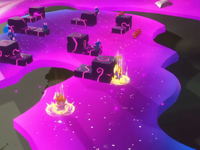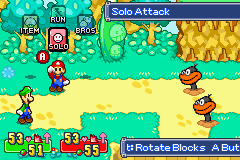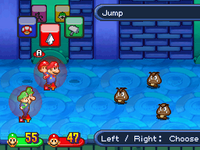POW-Up: Difference between revisions
(→Mario & Luigi: Paper Jam: Why would he be counted as a boss?) Tags: Mobile edit Advanced mobile edit |
m (Text replacement - "\| *((Jap|Ara|Arm|Bos|Bul|Cat|Chi|ChiS|ChiT|Cro|Cze|Dan|Dut|Est|Fin|Fre|FreA|FreE|Geo|Ger|Gre|Heb|Hin|Hun|Ice|Ind|Ita|Kor|Lat|Lit|Mac|Mal|Nor|Pol|Por|PorA|PorE|Rom|Rus|Ser|SerCro|Svk|Svn|Spa|SpaA|SpaE|Swe|Tha|Tur|Ukr|Vie)\d*) *= *([^\n]+) *<small>\(([^\n\(\)]+)\)<\/small>\n" to "|$1=$3 |$1N=$4 ") |
||
| Line 64: | Line 64: | ||
|Fre2=Puissance d'attaque doublée | |Fre2=Puissance d'attaque doublée | ||
|Fre2M=Attack power doubled | |Fre2M=Attack power doubled | ||
|Ita=Abilità su<ref>{{cite|title=''Paper Mario'' European instruction booklet|page=139|language=it|publisher=Nintendo of Europe}}</ref> | |Ita=Abilità su<ref>{{cite|title=''Paper Mario'' European instruction booklet|page=139|language=it|publisher=Nintendo of Europe}}</ref> | ||
|Ita2=Potenza + | |ItaN=''Paper Mario'' | ||
|Ita3=ATT su<ref>{{cite|format=PDF|url=www.nintendo.com/eu/media/downloads/games_8/emanuals/nintendo_ds_21/Manual_NintendoDS_MarioAndLuigiPartnersInTime_IT.pdf|title=''Mario & Luigi: Partners in Time'' European instruction booklet|page=89|date=2005|publisher=Nintendo of Europe|language=it}}</ref> | |Ita2=Potenza + | ||
|Ita2N=''Mario & Luigi: Superstar Saga'' | |||
|Ita3=ATT su<ref>{{cite|format=PDF|url=www.nintendo.com/eu/media/downloads/games_8/emanuals/nintendo_ds_21/Manual_NintendoDS_MarioAndLuigiPartnersInTime_IT.pdf|title=''Mario & Luigi: Partners in Time'' European instruction booklet|page=89|date=2005|publisher=Nintendo of Europe|language=it}}</ref> | |||
|Ita3N=''Mario & Luigi: Partners in Time'' | |||
|ItaM=Skill up | |ItaM=Skill up | ||
|Ita2M=Power + | |Ita2M=Power + | ||
Revision as of 07:47, August 28, 2024
- This article is about the status effect which means "power-up". For the power-ups that transform Mario into different forms in various Super Mario platformer games, see List of power-ups.
POW-Up is a positive status condition that has appeared in several Super Mario RPGs. It stands for "Power-Up".
History
Super Mario RPG: Legend of the Seven Stars
In Super Mario RPG: Legend of the Seven Stars and its remake, the Energizer and Yoshi-Ade items increase the user's attack power by 50%. The Party Energizer item has the same effect on the whole party. Geno can bestow this status to the party with his Geno Boost.
In the remake, the Flower Essence item from the Toad Assist move also raises attack power for one ally.
Paper Mario series
Paper Mario
In Paper Mario, Watt's ability, Turbo Charge can increase Mario's attack power by 1 for one to four turns. Red Magikoopas and Magikoopas can grant themselves or their allies increased attack by 1, Super Blooper can increase its attack by 2. Also, some enemies can charge their power like the Hyper Goombas and Hyper Clefts.
Paper Mario: The Thousand-Year Door
In Paper Mario: The Thousand-Year Door, several items and the Crystal Star power called Power Lift can raise attack power. The "Attack is boosted!" status is indicated by an angry face above Mario or his partner. The Huge status effect also boosts attack. Charging also boosts attack power for the next attack only; this is indicated by the affected character changing color repeatedly in a pulsing fashion. Enemies can have this status effect, also, by taking up a turn to charge.
Paper Mario: Sticker Star
In Paper Mario: Sticker Star, it acts like Paper Mario: The Thousand-Year Door. Mario can obtain it with a Leaf sticker, and Sombrero Guys can give it to other enemies. Mario can also use the Boom Box to double his attack.
Paper Mario: The Origami King
In Paper Mario: The Origami King, Mario can receive a x1.5 boost in striking power for one turn by lining up all enemies. If this happens without expending all moves, Mario's attack power is doubled instead, and, in turns when all the enemies are already lined up, due to all who would not be aligned being defeated, a special message saying, "Now! Finish them off! Attack power up!" appears. Passing over a x2 Striking Power panel while fighting a boss will also double Mario's attack power. Enemies also receive a boost in power when angry, indicated by a pink and red anger symbol.
Mario & Luigi series
Mario & Luigi: Superstar Saga / Mario & Luigi: Superstar Saga + Bowser's Minions
Red Peppers boost attack power (and give the Heavy G status effect) in Mario & Luigi: Superstar Saga and its 3DS remake, giving more power to Mario and Luigi's attacks. In the original game, the status boosts POW by 50%, while in the remake it instead boosts base POW by 25% (stacking additively with other POW boosts). The status is indicated by a red burst with an arrow pointing up next to Mario and Luigi's HP.
Mario & Luigi: Partners in Time
Red Peppers appear again in Mario & Luigi: Partners in Time, although they affect both fighters currently active and do not give the Heavy G status. POW-Up is indicated by an expanding red circle around the character. Certain enemies can also raise their own attack power by becoming enraged (usually due to low HP), like Bullies.
Mario & Luigi: Bowser's Inside Story / Mario & Luigi: Bowser's Inside Story + Bowser Jr.'s Journey
The POW-Up status effect also appears in Mario & Luigi: Bowser's Inside Story and Mario & Luigi: Bowser's Inside Story + Bowser Jr.'s Journey, with the same effects as the previous games. It can be received by Bowser if he inhales the meat seen during the second Midbus battle.
Mario & Luigi: Dream Team
POW-Up returns in Mario & Luigi: Dream Team. Mario and Luigi can receive it by using the combined effect of the Gold Badge and the Guard Badge. The combination of the Risk Badge and the Silver Badge does the same thing, but additionally grants it to all enemies. As the Secret Box applies a Badge effect chosen at random, it may use one of the prior effects.
Certain opponents can gain POW-Up. In the third battle against Kamek, his green clone grants the entire Kamek team stat boosting effects, possibly including POW-Up. In the final battle against Antasma, he eats one or more of his Antasmunchies to gain POW-Up. The same is true for Antasma X, who eats his Antasmunchies X.
Mario & Luigi: Paper Jam
POW-Up returns in Mario & Luigi: Paper Jam. By using a POW-Up Battle Card, Mario, Luigi and Paper Mario can increase their attack power. Additionally, bosses gain a combination of the effect and SPD-Up when their health runs low.
Mario + Rabbids Sparks of Hope

- “Damage bonus when attacking with Weapons or Movement abilities.”
- —Hero Info description, Mario + Rabbids Sparks of Hope
In Mario + Rabbids Sparks of Hope the Pow-Up status is called Empowered, and is a state in which damage for weapon and movement abilities is boosted. The Turbocharge ability from the Spark Starburst bestows this status on the user and any other allies within range for a single turn. Magikoopas and Midnite also use the Empowered ability (Misty Surge for the latter) for themselves and any enemies within range; their cooldowns lasting two turns.
Names in other languages
| Language | Name | Meaning | Notes |
|---|---|---|---|
| Japanese | ツヨツヨ (Paper Mario: The Thousand-Year Door)[?] Tsuyotsuyo |
Strong-strong | |
| French | Augmentation habilité[1] | Increase skill | |
| Puissance d'attaque doublée[?] | Attack power doubled | ||
| Italian | Abilità su[2] | Skill up | Paper Mario |
| Potenza +[?] | Power + | Mario & Luigi: Superstar Saga | |
| ATT su[3] | ATK up | Mario & Luigi: Partners in Time |
References
- ^ 2001. Paper Mario European instruction booklet (PDF). Nintendo of Europe (French). Page 69.
- ^ Paper Mario European instruction booklet. Nintendo of Europe (Italian). Page 139.
- ^ 2005. Mario & Luigi: Partners in Time European instruction booklet (PDF). Nintendo of Europe (Italian). Page 89.
- Mario & Luigi: Superstar Saga status effects
- Mario & Luigi: Partners in Time status effects
- Mario & Luigi: Bowser's Inside Story status effects
- Mario & Luigi: Dream Team status effects
- Mario & Luigi: Paper Jam status effects
- Paper Mario status effects
- Paper Mario: Sticker Star status effects
- Paper Mario: The Thousand-Year Door status effects
- Mario + Rabbids Sparks of Hope Super Effects
- Puzzle & Dragons: Super Mario Bros. Edition status effects
- Super Mario RPG: Legend of the Seven Stars status effects


